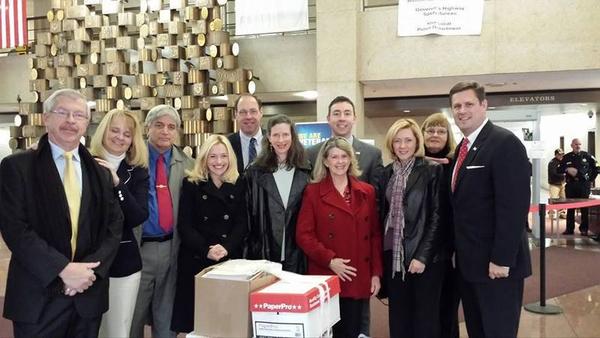Oh tidings of great
citizen joy. Last week several groups of activists from across the
political spectrum managed to collect enough signatures to get their
initiative petitions heading for the 2014 ballot.
Each petition needed
68,911 certified signatures, which means the signatures collected
through the fall had to be validated by city and town clerks as
belonging to registered voters before being turned in to the
secretary of state on Dec. 4. This means that petition groups aim to
collect 100,000 signatures, since many would be either invalid,
duplicates, or in violation of some regulation; if you’ve never run
one of these drives, you can’t imagine how time- and
energy-consuming they are.
Because I’ve been
involved in several, I am amazed that one campaign, named “Tank the
Automatic Gas Tax,” filed 87,620 signatures; since it was responding
to a tax increase package that passed in mid-summer, its amateur
supporters had a very short time to put together a viable statewide
effort. Another group, formed to prohibit casino gambling, had an
even tougher row to hoe, as their petition was ruled improper by
Attorney General Martha Coakley; they had to proceed in the hope of
getting her decision overruled by the state Supreme Judicial Court
sometime after the drive.
|
|
 |
| |
Organizers of the Tank the
Automatic Gas Tax Hikes petition campaign deliver boxes
of certified signatures to the Statehouse. |
Unions usually have an
easier time organizing anything so they collected plenty of
signatures for a minimum wage increase, paid sick leave, nurse
staffing and hospital administration petitions.
MassPIRG, an old hand
at initiative petitions, filed 105,000 signatures for its expanded
bottle bill. I could support this if I didn’t think it unfair to
expand grocery stores’ responsibility for accepting and storing even
more items, of many different sizes.
I do really like what
MassPIRG’s Janet Domenitz told the State House News Service after
the announcements of the victorious drives:
“This is a sacred
process,” Domenitz said. “We’re all honored to be a part of it.”
Yes, these are the
tidings of citizen joy: that citizens, distracted by so much going
on in their lives, still took time to stop and sign initiative
petitions. Whether we agree with the subject of the petitions or
not, we can celebrate participation in democracy.
Next steps: the state
Constitution requires that all the petitions have a public hearing
and a required up or down vote, no changes, by the first Wednesday
in May. If the Legislature enacts it, the petition becomes law. If
the Legislature votes No, or doesn’t vote, petitioners must get
another 11,485 certified signatures, from different voters, before
their issue can be placed on the November 2014 statewide ballot with
the legislators who didn’t like it.
This will be especially
interesting with the gas tax issue, since those legislators will
have to explain their position that future gas tax increases should
be automatic, relative to inflation, never again requiring a roll
call vote. I am hoping that they all have opponents who will
disagree with this theory and argue that all taxation should have
representation with a visible roll call vote.
My personal concern is
that the concept might catch on, and future legislatures will make
income, sales and property taxes automatically increase with
inflation, without any politician voting for any tax hike ever
again. Special kudos to those Republican legislators who voted No on
the original tax package, then helped lead the petition drive to
repeal this outrageous automatic section themselves.
To add drama to the
2014 election, the petitions will be on the ballot with governor
candidates. It’s safe to say that Charlie Baker and his lieutenant
governor candidate, Karyn Polito, will be opposed to automatic tax
increases; I’m eager to hear how the Democrats feel about this.
If she wins the
nomination, Martha Coakley will also have to defend her opposition
to letting voters decide the casino issue. As nearly as I can
understand her argument, she thinks there’s some kind of contract
with potential casino operators that since they got started with the
process of approval, perhaps buying some land, they are entitled to
actually build the casinos.
And yet, the attorney
general had no problem allowing the recent initiative petition that
shut down the dog tracks that were already existing businesses that
had long ago contracted with some local communities to operate
there, creating jobs.
In a perfect
libertarian world, anyone could operate a legal business anywhere on
their own land, and gamblers could put their money down and take
their chances. In our real Massachusetts world, “legal” will quickly
add aspects of illegality, taxpayers will be picking up the extra
public safety costs, and then we’ll be forced to cover the social
costs of gambling as well. This is why, at the very least, the
commonwealth’s voters should make the decision. I hope the SJC
agrees.
The last petition drive
I was involved with was the state income tax rate cut in 1999-2000.
When the three-year rollback was frozen by a disrespectful
Legislature in 2002, I kind of lost faith in initiative democracy.
However, that tax rate has been slowly defrosting toward 5 percent,
and the success of the TankTax drive was inspiring; I’m feeling the
faith again.